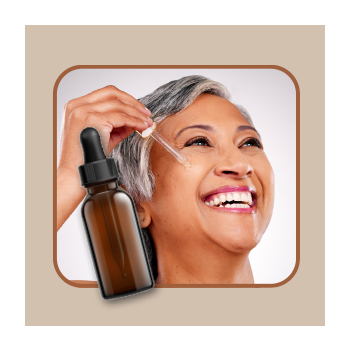


Sign-up for {N}power to get exclusive discounts, newsletters, members-only features, and more!

What if your daily skincare routine could work behind the scenes, with minimal effort and money spent, yet with the maximum results to restore, repair, and maintain your skin’s natural barrier? With natural topical agents like ceramides and hyaluronic acid, and skin-supporting supplements like omega-3 fatty acids, you can support and nourish your skin barrier to get a healthy, natural glow.

Why should we care about our skin barrier? For starters, our skin is our largest organ, “serving as a chemical, physical, and immune barrier between the internal and the external environment.”1 2 3 It serves as a permeable barrier, preventing excessive water/moisture loss, while protecting the body from various insults, be it bacterial or environmental like air pollution, allergens, and UV rays. When the skin barrier is damaged—from factors like aging, abrasive washing, overuse of products like peels and scrubs, hot water, and cold, dry weather—skin becomes dry, itchy, irritated, and flaky.
 Ceramides—fats, or lipids, that are found in skin cells and play an important role in skin barrier function—make up about 50 percent of our outer skin layer, called the stratum corneum.4 As we age, levels of natural ceramides decrease; additionally, the same factors that damage the skin barrier (abrasive washing, etc.) can also deplete ceramides in the skin. When levels of ceramides are low, this allows moisture to escape the skin, letting in irritants, pollution, and even infectious agents like bacteria, which leaves skin dry, irritated, and inflamed and can eventually lead to psoriasis, eczema, and acne.5
Ceramides—fats, or lipids, that are found in skin cells and play an important role in skin barrier function—make up about 50 percent of our outer skin layer, called the stratum corneum.4 As we age, levels of natural ceramides decrease; additionally, the same factors that damage the skin barrier (abrasive washing, etc.) can also deplete ceramides in the skin. When levels of ceramides are low, this allows moisture to escape the skin, letting in irritants, pollution, and even infectious agents like bacteria, which leaves skin dry, irritated, and inflamed and can eventually lead to psoriasis, eczema, and acne.5
Many skincare creams on the market today contain synthetic ceramides and plant-derived phytoceramides (“phyto” meaning plant). Both forms are effective at replenishing natural skin ceramides and restoring healthy barrier function, improving dry, itchy, flaky skin, and even dermatitis and psoriasis.6 7 Oils such as jojoba, safflower, and grapeseed are naturally high in ceramides. The ceramides in jojoba oil are especially high, around 96 percent, and can be found in many anti-aging skincare products, as they help to reduce fine lines and wrinkles.8 Studies also show that jojoba oil is a good option for those with altered skin barriers, as in the cases of seborrheic dermatitis (dandruff), eczema, and acne.9 Besides jojoba oil, there are many creams and lotions that include ceramides; simply look for “ceramides” in the ingredient list. Niacinamide is another ingredient to look for—used topically, this B vitamin supports the body’s natural production of ceramides.10
Hyaluronic Acid Plumps and Moisturizes
Hyaluronic Acid (HA) is a humectant—a substance that retains moisture—and is capable of binding over one thousand times its weight in water. It’s present in every tissue of the body, with some of the highest concentrations found in the skin.11 It’s no wonder HA seems to be in every topical skincare product these days.
 A 2021 study examined the effects of HA facial serum on skin benefits in those with signs of photoaging, a term used by dermatologists to refer to the damage caused when the sun prematurely ages the skin, and also a sign of skin barrier damage.12 Forty subjects with photoaging, ages 30–65 years, were given a HA facial serum twice a day with sunscreen. Immediately after application, there was a 134 percent increase in skin hydration. At week six, there were staggering improvements on the whole: 63% in hydration, 64% in skin smoothness, 60% in plumpness, 31% in fine lines, and 14% in wrinkles.13
A 2021 study examined the effects of HA facial serum on skin benefits in those with signs of photoaging, a term used by dermatologists to refer to the damage caused when the sun prematurely ages the skin, and also a sign of skin barrier damage.12 Forty subjects with photoaging, ages 30–65 years, were given a HA facial serum twice a day with sunscreen. Immediately after application, there was a 134 percent increase in skin hydration. At week six, there were staggering improvements on the whole: 63% in hydration, 64% in skin smoothness, 60% in plumpness, 31% in fine lines, and 14% in wrinkles.13
While topical skincare helps to support skin barrier function to maintain healthy, glowing skin, don’t overlook nutrients that you can take to restore, replenish, and renew your skin from within. Take, for example, the omega-3 fatty acids (O3FAs). A comprehensive review of 38 studies reporting benefits for O3FA supplementation in the treatment of psoriasis, atopic dermatitis, and acne concluded that “given O3FA’s high safety profile, low cost, and ease of supplementation, O3FA is a reasonable supplement that may benefit patients wishing to improve inflammatory skin conditions through diet.” The omega-3 fats have been shown to protect the skin from UV damage and reduce inflammation in the skin, both of which protects skin barrier health.14 15 The omega-6 fatty acid gamma linolenic acid (GLA) has also been shown to improve skin barrier function by reducing moisture loss from the epidermis and reducing inflammation in people with dry skin and mild dermatitis. The combination of GLA plus omega-3s was found to improve psoriasis.16
 The powerful antioxidants lutein and zeaxanthin that give plants their vibrant yellow and gold colors are proving to be pivotal for skin health. One study confirmed that just 10 mg lutein + 0.6 mg zeaxanthin (these antioxidants occur together naturally) per day for 90 days provided significant improvement in skin hydration (60%), elasticity (20%), and resistance to UV exposure (75%), all of which can support healthy barrier function and reduce the appearance of fine lines and wrinkles.17 These antioxidants also protect lipids in the skin, like ceramides, from oxidative damage. Load up on lutein and zeaxanthin and let your glowing skin be the judge!
The powerful antioxidants lutein and zeaxanthin that give plants their vibrant yellow and gold colors are proving to be pivotal for skin health. One study confirmed that just 10 mg lutein + 0.6 mg zeaxanthin (these antioxidants occur together naturally) per day for 90 days provided significant improvement in skin hydration (60%), elasticity (20%), and resistance to UV exposure (75%), all of which can support healthy barrier function and reduce the appearance of fine lines and wrinkles.17 These antioxidants also protect lipids in the skin, like ceramides, from oxidative damage. Load up on lutein and zeaxanthin and let your glowing skin be the judge!
Taking care of your skin should be stress-free and simple. Maximize the benefits of a few key ingredients and supplements that will replenish and protect your skin barrier and have your skin glowing in no time. As a rule of thumb, look for skincare products sold at stores with the highest quality standards in body care—stores that vet each product to ensure they’re free from harmful chemicals like phthalates and parabens.



Sign-up for {N}power to get exclusive discounts, newsletters, members-only features, and more!